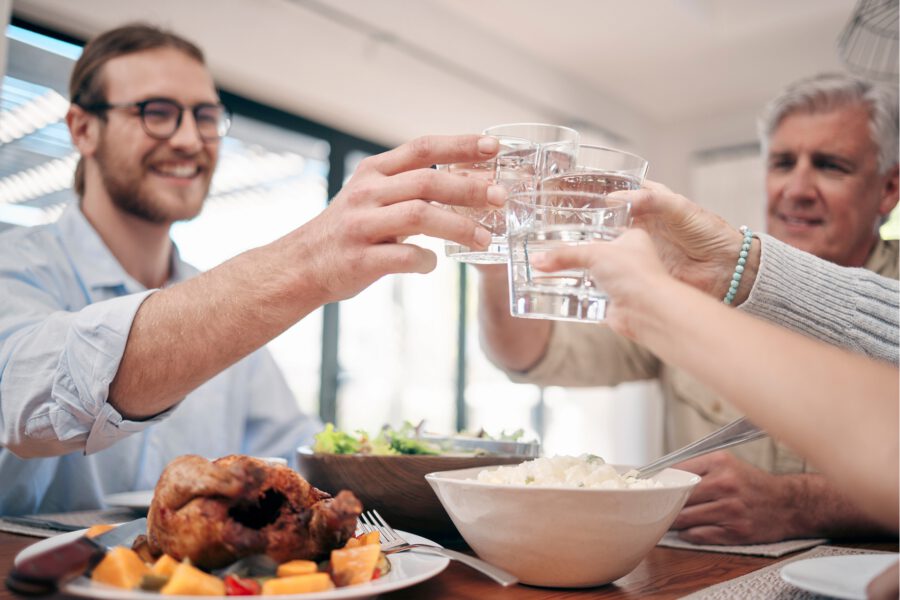8 Tips How to Avoid Stomach Bloating this Holiday Season
The holiday season is undoubtedly here, from the cold weather that is felt around the world to the festive dinners and dates with family and friends.
Indeed, holidays are a time for indulgence, laughter, and delicious meals. However, this time of joy and togetherness is often accompanied by unpleasant feelings of bloating and other stomach issues.
This article will discuss how to avoid bloating this holiday season so you can enjoy quality time with your loved ones without the discomfort of a swollen stomach.
Bloating occurs when your digestive system struggles to process food efficiently, leading to a buildup of gas or fluid in your stomach or intestines. This can leave you feeling swollen, tight, and uncomfortable.
Common causes of bloating include swallowing excess air while eating, undigested food fermenting in the gut, and fluid retention. While bloating is usually harmless, it can disrupt your enjoyment—especially during the holidays.
Holiday meals are often larger than usual, causing the stomach to stretch to accommodate the extra food. This stretching triggers receptors in the stomach lining, creating a sensation of fullness or discomfort.
Overeating also slows digestion, increasing the chances of gas buildup. Irregular eating patterns during the holidays, like grazing all day or skipping meals to “save room” for a big dinner, can further disrupt digestion and lead to bloating.
1. Chew your food thoroughly
Chewing your food thoroughly and eating slowly are simple ways to prevent bloating, yet they’re often overlooked due to our desire to socialize and get back to fun activities.
Eating quickly can cause you to swallow excess air (aerophagia), which accumulates in the stomach and contributes to bloating.
Chewing helps break down food, making it easier to digest and reducing the chance of gas buildup. It also triggers saliva production, which starts digestion in your mouth and eases the work for your stomach. When you take your time, you give your body a chance to digest properly and recognize when you’re full.
During the holidays, tables are often laden with carb-rich dishes like creamy mashed potatoes, buttery rolls, pasta, and desserts. While these foods are undeniably delicious, they can lead to bloating when consumed in excess.
Pairing high-carb meals with healthy fats, such as those found in avocados, nuts, seeds, and olive oil, slow down the digestion of carbohydrates. This helps prevent the rapid spikes in blood sugar and fermentation in the gut that can lead to excessive gas production and bloating.
Slower digestion also allows your body to absorb nutrients more efficiently, making your meal more satisfying and easier for your digestive system.
Berberine, a plant-derived compound, is known for its benefits in supporting gut health and digestion. It regulates gut bacteria, balances the microbiome, and reduces inflammation in the digestive tract.
More importantly, berberine improves the body’s response to insulin, helping regulate blood sugar levels more effectively and allowing cells to absorb glucose from the bloodstream efficiently. It also reduces post-meal blood sugar spikes by slowing the absorption of glucose into the bloodstream after eating.
Taking berberine supplements, especially before heavy meals, may help prevent post-meal bloating by aiding the breakdown of food and minimizing gas production. However, it’s essential to consult your doctor before adding berberine to your routine, as it may not be suitable for everyone or could interact with certain medications.
Drinking water before and after meals helps break down food efficiently and reduces the risk of water retention, which can cause bloating. Proper hydration also supports regular bowel movements, preventing gas buildup and discomfort.
Avoid drinking too much water during meals, as it can dilute stomach acids and hinder digestion. Instead, sip in moderation and focus on staying hydrated throughout the day.
High salt and fat intake, especially common during holiday feasts, can significantly contribute to bloating. Salt causes water retention, leading to swelling and a bloated feeling, particularly after eating salty foods like cured meats and gravies. Fats, along with refined carbohydrates, take longer to digest. The longer food remains in your digestive system, the greater the chance of fermentation, which produces gas and discomfort.
Large portions, salty snacks, and fatty foods also stretch your stomach, causing gases and solids to pool in your gut. This can slow digestion and increase the likelihood of bloating. To manage this, reduce portion sizes and limit foods high in salt and fat, such as fried foods, chips, and chocolate.
Carbonated drinks like sodas and sparkling beverages can be a major contributor to bloating. These fizzy drinks introduce excess gas into your digestive system, often leading to a feeling of fullness, tightness, or discomfort. The carbonation bubbles don’t just disappear—they accumulate in your stomach, making bloating worse.
To avoid this, opt for still water or soothing herbal teas instead. Beverages like peppermint or ginger tea can even help ease digestion and reduce bloating, making them a perfect alternative during holiday meals.
Alcoholic drinks like beer and cocktails can contribute to bloating. Beer introduces excess gas into your system, and alcohol irritates the stomach lining while slowing digestion. This combination often leads to discomfort and a swollen feeling.
To prevent bloating, limit alcohol during holiday meals. If you decide to indulge, drink in moderation and stay hydrated with water to ease any potential discomfort.
Certain foods, like beans, broccoli, onions, and dairy, can trigger bloating due to their harder-to-digest compounds. While healthy, these foods may cause gas buildup for some people. Understanding your body’s triggers allows you to adjust your diet and avoid discomfort.
Fiber, though beneficial for digestion, can also lead to bloating if introduced suddenly or consumed in large amounts. If you’re not used to high-fiber foods, increase intake gradually and drink plenty of water to help your gut adapt and avoid bloating.
Some food choices and habits may increase the chance of bloating:
- Artificial sweeteners
- Carbonated and alcoholic beverages
- Drinking through a straw
- Eating large meals
- Talking during mealtime
- Chewing gum
- Milk products
Drinking from a straw increases the amount of air you swallow because air is often pulled into your stomach along with the liquid. This trapped air eventually accumulates in your digestive system, which can lead to bloating and discomfort.
Here’s a plan for women that will help you stay fit during the holidays:
And for men:
When you’re stressed, your body activates the “fight or flight” response, diverting energy away from the digestive system. This can slow down digestion, causing food to sit longer in your stomach and increasing the likelihood of gas and discomfort. Stress can slow or accelerate digestion, alter gut motility, and increase sensitivity to normal levels of gas, making bloating feel more intense.
Additionally, stress can lead to habits like eating too quickly or consuming foods that are harder to digest, further exacerbating bloating.
To manage stress, prioritize relaxation techniques, especially during the busy holiday season. Practices like deep breathing, meditation, or even a short walk can calm your nervous system and support healthy digestion.
Research suggests that probiotics may help reduce bloating and other digestive symptoms by increasing the number and diversity of healthy bacteria in your gut. These beneficial bacteria play a critical role in breaking down food more efficiently, which can help minimize gas production and ease discomfort.
Probiotics are available as supplements but can also be found naturally in certain foods, such as yogurt, sauerkraut, kimchi, kombucha, miso, and pickles. Including these foods in your diet is an easy way to support gut health.
The holiday season is a time for joy, connection, and celebration. Being mindful of your health doesn’t mean restricting yourself; it’s about finding balance. Bloating is your digestive system’s way of asking for that balance—a gentle reminder to care for your body while enjoying the festivities.
Your body works best when you listen to it. Slow down, savor each bite, and focus on being fully present.

